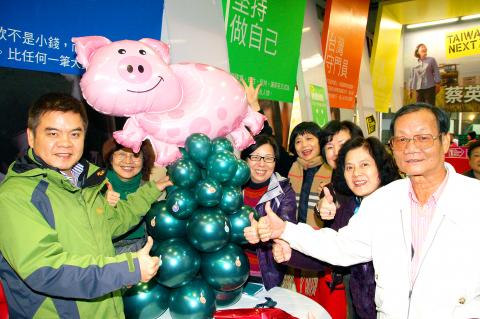The three candidates for the Jan. 14 presidential election yesterday evening outlined their policy platforms in the first of the three televised presentations hosted by the Central Election Commission (CEC).
The presentation was held between 8pm and 9:40pm at the Chinese Television System and each candidate was given three 10-minute slots to make their presentations.
In reference to comments by President Ma Ying-jeou (馬英九) on Thursday that Democratic Progressive Party (DPP) Chairperson Tsai Ing-wen (蔡英文) does not wish to embrace the so-called “1992 consensus” because she did not recognize the Republic of China (ROC), Tsai said in her presentation that “Taiwan is the ROC and the ROC is Taiwan.”

Photo: Chen Wei-min, Taipei Times
She add that if Ma succeeded in his re-election bid, “our generation would very possibly face the question of ultimate unification.”
Tsai elaborated that the ROC she referred to is the island of Taiwan and its outlying islands, which is different from the ROC Ma was talking about, which included all of China’s territory.
“No matter whether [its the name] of Taiwan or ROC, it is the land that the people of Taiwan have fought for and the place where 23 million Taiwanese have lived for generations,” Tsai said.
On economic policy, Tsai criticized Ma by saying that his administration had only two approaches when dealing with economic policies.
The first was to open up to China and use its market as a panacea for all economic woes, which led to the signing of the Economic Cooperation Framework Agreement (ECFA), Tsai said, and the second was to raise debt and spend more money.
It is not difficult to have an efficient and responsible government, the key principles being that the leader can grasp the meaning of the policies and force the governmental machine to become “well-oiled” and not become too proud, Tsai said, adding that Ma hadn’t achieve the two principles in the nearly four years he has been president.
“The people have waited and suffered for four years and now they can’t wait any longer,” Tsai said.
Meanwhile, Ma said his administration had given the people of Taiwan a sense of security and that his presidency would be the safest choice for Taiwanese.
Stating that giving people a sense of security was the most basic responsibility of being a president, Ma added that the big difference between his administration and that of the DPP was the difference between who can truly safeguard Taiwan’s sovereignty and safety.
“We walked out of the shadows the DPP couldn’t get out of,” Ma said, adding that the DPP’s refusal to recognize the “1992 consensus” would only push cross-strait relations into uncertainty, and it was difficult to calculate what the impacts would be.
People First Party Chairman James Soong (宋楚瑜) said long-term governing by the DPP and the Chinese Nationalist Party (KMT) has tired people with their bickering.
On the cross-strait policy issues, Soong said Tsai continuously talked about the “Taiwan consensus,” but what if the DPP did not abide by the ROC’s Constitution?
“Is the Taiwanese identity higher than that of the ROC Constitution? What else should we do?” Soong asked
Not only is Taiwan’s military and society struggling, but the country’s is unsafe and there is also the social insecurity arising from the growing wealth gap, Soong said, adding that the more serious problem lies in how to revitalize the economy.

Alain Robert, known as the "French Spider-Man," praised Alex Honnold as exceptionally well-prepared after the US climber completed a free solo ascent of Taipei 101 yesterday. Robert said Honnold's ascent of the 508m-tall skyscraper in just more than one-and-a-half hours without using safety ropes or equipment was a remarkable achievement. "This is my life," he said in an interview conducted in French, adding that he liked the feeling of being "on the edge of danger." The 63-year-old Frenchman climbed Taipei 101 using ropes in December 2004, taking about four hours to reach the top. On a one-to-10 scale of difficulty, Robert said Taipei 101

Nipah virus infection is to be officially listed as a category 5 notifiable infectious disease in Taiwan in March, while clinical treatment guidelines are being formulated, the Centers for Disease Control (CDC) said yesterday. With Nipah infections being reported in other countries and considering its relatively high fatality rate, the centers on Jan. 16 announced that it would be listed as a notifiable infectious disease to bolster the nation’s systematic early warning system and increase public awareness, the CDC said. Bangladesh reported four fatal cases last year in separate districts, with three linked to raw date palm sap consumption, CDC Epidemic Intelligence

US climber Alex Honnold left Taiwan this morning a day after completing a free-solo ascent of Taipei 101, a feat that drew cheers from onlookers and gained widespread international attention. Honnold yesterday scaled the 101-story skyscraper without a rope or safety harness. The climb — the highest urban free-solo ascent ever attempted — took just more than 90 minutes and was streamed live on Netflix. It was covered by major international news outlets including CNN, the New York Times, the Guardian and the Wall Street Journal. As Honnold prepared to leave Taiwan today, he attracted a crowd when he and his wife, Sanni,

Taiwanese and US defense groups are collaborating to introduce deployable, semi-autonomous manufacturing systems for drones and components in a boost to the nation’s supply chain resilience. Taiwan’s G-Tech Optroelectronics Corp subsidiary GTOC and the US’ Aerkomm Inc on Friday announced an agreement with fellow US-based Firestorm Lab to adopt the latter’s xCell, a technology featuring 3D printers fitted in 6.1m container units. The systems enable aerial platforms and parts to be produced in high volumes from dispersed nodes capable of rapid redeployment, to minimize the risk of enemy strikes and to meet field requirements, they said. Firestorm chief technology officer Ian Muceus said